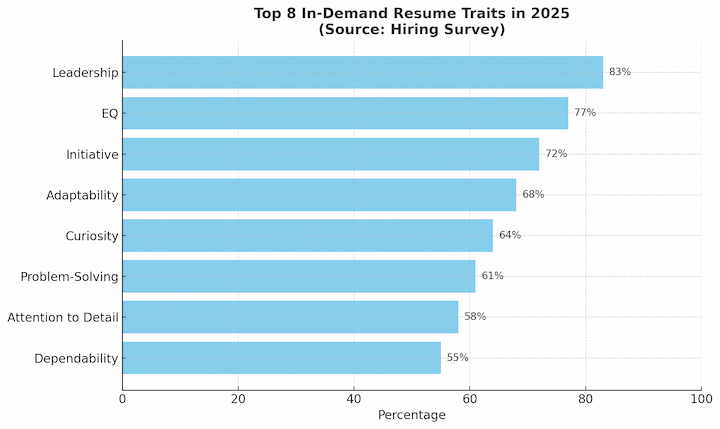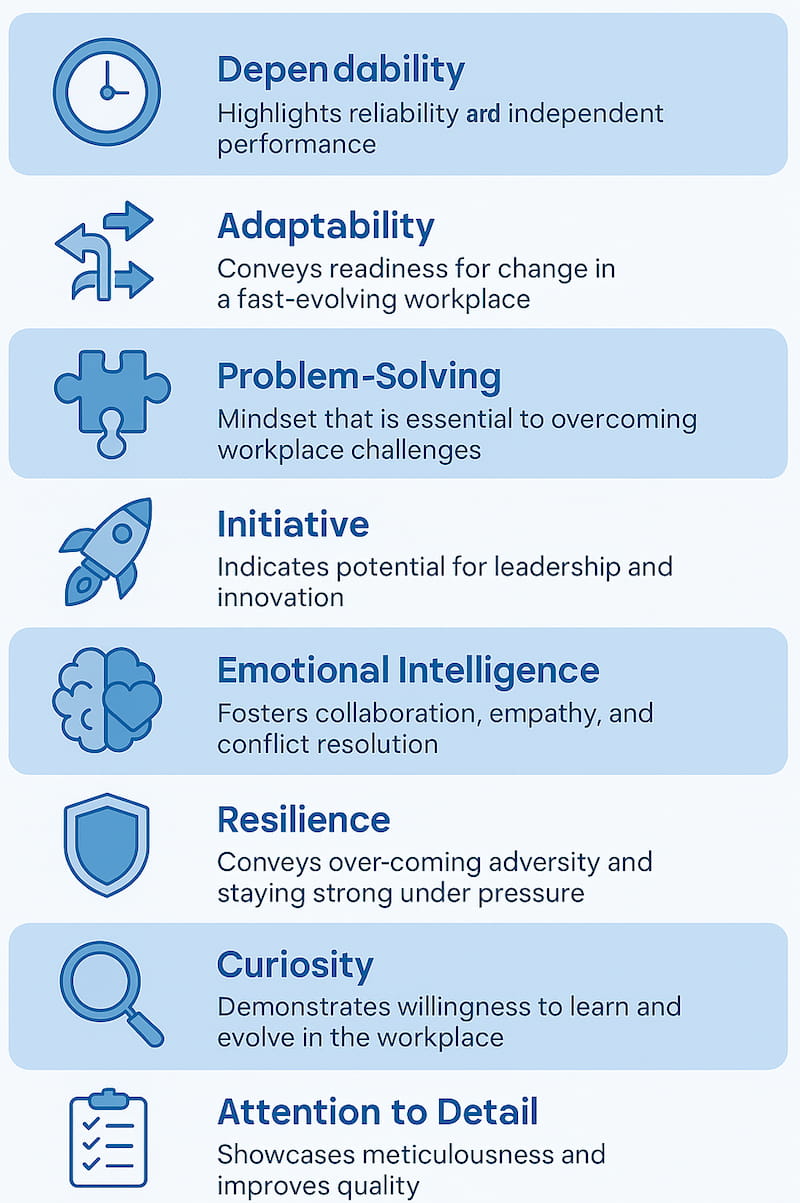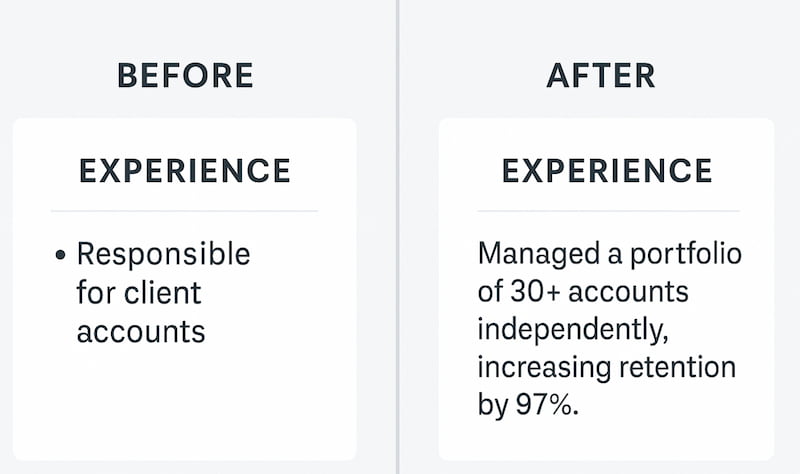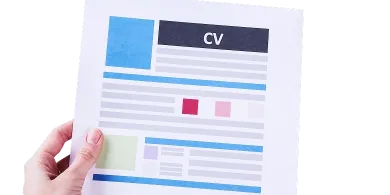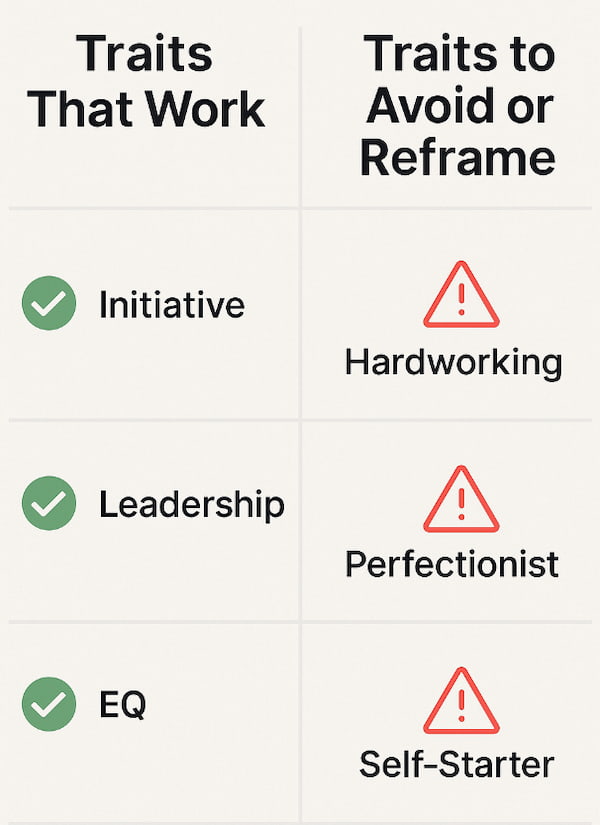Updated on January 6, 2026

Your resume serves as your personal marketing campaign, which is why making an instant great impression is imperative. It is an elevator pitch, the handshake, the first impression, all condensed into one tidy document. While listing your skills and experience is crucial, many job seekers overlook what instantly differentiates them: traits.
Good traits on a resume help to portray your key skills and abilities clearly, and demonstrate what you bring to the table and how you perform. In a market that’s absolutely drowning in credentials and buzzwords, it is crucial to select the right character traits because it can be the difference between landing an interview or landing in the recycle bin.
Let’s explore what ‘good traits’ look like:

Free resume critique
from certified writers!
-
-
The Hall of Fame: Traits That Instantly Signal “Hire Me”
While it is true that employers can teach you software, protocols, etc; but what they can’t teach, at least not easily, are core traits like drive, integrity, and emotional intelligence. More often than not, the entire selection process is dependent on these core qualities.
Some of the best traits you can (and should) weave into your resume include:
- Dependability. This is a great skill because it shows that you are reliable, and it also demonstrates that you don’t need hand-holding to deliver excellent work.
- Adaptability. Business moves fast. If you show you can thrive amid change, you become a top candidate.
- Problem-Solving Mindset. Problems are inevitable. Employees who find solutions, not just spot issues, are rare and highly valued.
- Initiative and Proactiveness. People who act without being told are the oxygen that keeps companies alive. It’s a trait that screams leadership potential.
- Emotional Intelligence (EQ). Collaboration, conflict resolution, and empathy with customers are all indicators of emotional intelligence.
- Resilience. This trait shows that you can bounce back after hurdles and deal with challenges effectively. Employers prize grit almost as much as genius.
- Curiosity and Willingness to Learn. Modern employers want “learn-it-alls,” people who grow with the job, not out of it.
- Attention to Detail. In a world where typos can cause substantial damage, meticulousness gives you a razor-sharp edge.
- Leadership. Leadership isn’t reserved for people with corner offices. It’s for those who can influence, guide, or mentor others, even at a junior level, because it paints you as future management material.
- Integrity. In industries where one ethical blunder can ruin a company, integrity is necessarily ‘survival.’

Furthermore, instead of merely listing skills, break down how you’ve demonstrated them. Here’s an example of showcasing dependability, initiative, and leadership rolled into one: “Proactively led a cross-departmental project that reduced processing times by 18%.”
-
How to Showcase Traits:

Let’s break down how to effectively showcase traits, without sounding like you copied from a self-help book. Here’s the secret sauce:
Need a career boost? Do your LinkedIn profile makeover!
Hire experts
- Match Areas of Expertise to Job Descriptions: While drafting your resume, scan the job description and see if it mentions “problem-solving,” “self-motivation,” or “team collaboration.” Mirror these in your resume, but only if they’re truly authentic to you. Tailoring your traits makes you look like a custom-fit.
- Weave Traits into Achievements: Instead of writing “strong work ethic,” show it through results e.g. “managed a portfolio of 30+ accounts independently, which increased retention rate by 97% over two years.” This helps demonstrate impact and establish credibility.
- Infuse Them into Your Career Summary: Your professional summary should be persuasive, clear, and tempting, and adding the right traits helps to achieve that.
-
Traits to Be Careful About or Avoid:

Not every trait belongs on a resume. Some are overused to the point of meaninglessness or can take up unnecessary space. Some traits can trigger red flags if poorly framed.
Some traits to avoid adding to your resume are:
- Hardworking – It’s better to avoid this, especially without context. Everyone can claim that they work hard. Show your hard work through accomplishments, not empty claims.
- Perfectionist – Some employers may interpret this as ‘gets stuck on tiny details and misses deadlines.’ Frame it instead as ‘commitment to high-quality outcomes,’ and show you can balance excellence with efficiency.
- Passionate – It’s a great word, but if you claim passion for everything, it loses power. Select one or two areas and back them up with actions.
- Self-Starter – Great trait, but as aforementioned, evidence matters. Otherwise, it sounds like a cliché buzzword.
Also, beware of adding excessive skills, e.g., overcrowding your resume with 25 traits in a desperate bid to seem impressive. Instead, curate 3–5 core traits that form the throughline of your professional brand, and make those shine.
Do you need help tailoring your resume with laser-focused traits and skills that improve your chances of securing an interview? Reach out to us at RWL, we’ll help you craft a resume that makes you look unforgettable in employers’ eyes.
Written by Dua Khan
Dua is a Certified Professional Resume Writer (CPRW) and Career Coach. Since 2019, she's dedicated her career to creating ATS-optimized job application materials for a diverse clientele, including Grammy-winning artists, and executives at Fortune 500 companies. Her expertise spans executive-level resumes, cover letters, and LinkedIn content, and she holds a successful track record of supporting clients from prestigious organizations such as the CDC, NOAA, NHS, and Johns Hopkins University to achieve their career aspirations.

